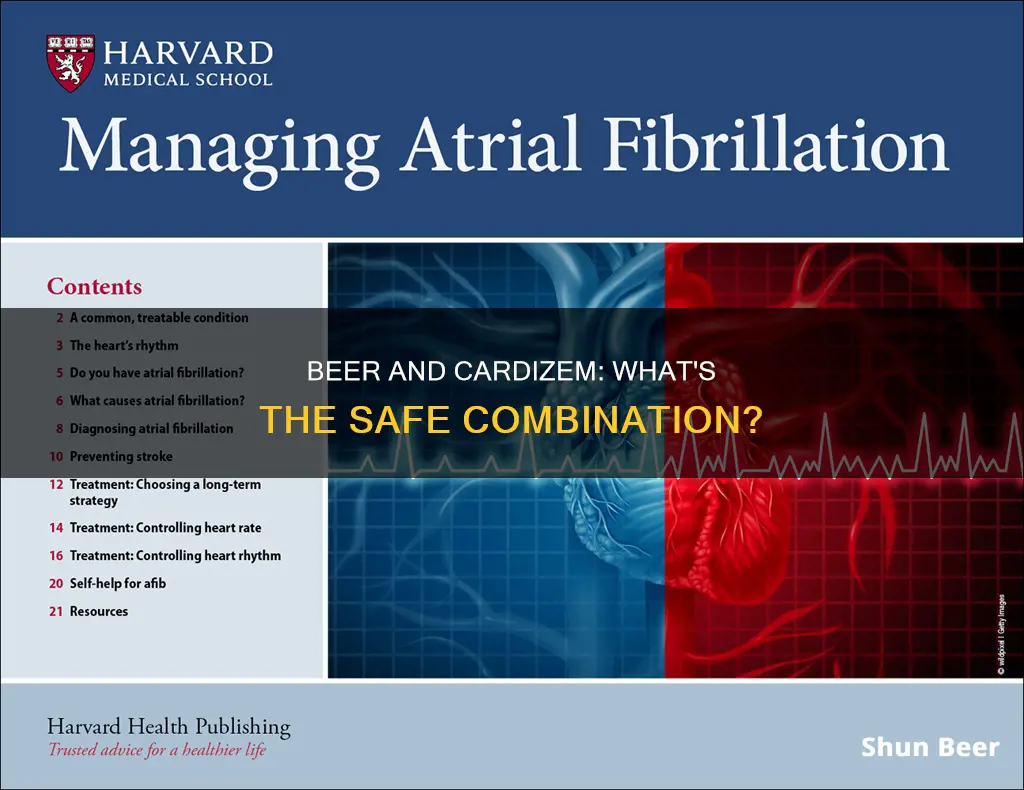
Drinking alcohol while taking Cardizem (diltiazem) is not recommended. Cardizem is a calcium channel blocker that treats high blood pressure and prevents chest pain (angina). Alcohol can lower your blood pressure and add to the effects of diltiazem, increasing the risk of side effects such as dizziness, lightheadedness, fainting, or a rapid heartbeat. In some cases, drinking alcohol while taking Cardizem can lead to dangerously low blood pressure, also known as hypotension. Therefore, it is generally advised to avoid alcohol consumption while taking this medication.
| Characteristics | Values |
|---|---|
| Can I drink beer with Cardizem? | It is not recommended to drink alcohol while taking Cardizem (Diltiazem) as it can increase the risk of dangerously low blood pressure and additive effects on blood pressure. |
| Symptoms of drinking alcohol with Cardizem | Dizziness, lightheadedness, fainting, rapid heartbeat, blurry vision, nausea, and vomiting. |
| Grapefruit juice interaction | Grapefruit juice may increase the effects of Cardizem by increasing its levels in the blood. |
| Notes for Professionals | Advise patients to avoid alcohol consumption while taking Cardizem. |
What You'll Learn
- Drinking beer with Cardizem can cause dizziness and lightheadedness
- Combining alcohol and Cardizem may lead to a rapid heartbeat
- The mixture can cause fainting and blurry vision
- Grapefruit juice may increase the effects of Cardizem
- Alcohol consumption can negatively impact the conditions Cardizem is used to treat

Drinking beer with Cardizem can cause dizziness and lightheadedness
Drinking alcohol while taking Cardizem (diltiazem) is not recommended. Both alcohol and diltiazem can lower your blood pressure, so drinking beer with Cardizem can cause additive effects on blood pressure, which may lead to orthostatic hypotension and increase the risk of dizziness and lightheadedness.
Diltiazem is a medication used to treat high blood pressure and prevent chest pain (angina). It belongs to a group of medications called calcium channel blockers, which work by relaxing the blood vessels and lowering the heart rate, thereby reducing the amount of work the heart has to do.
Alcohol consumption can further lower blood pressure and enhance the effects of diltiazem, especially when you first start taking the medication or after a dose increase. This additive effect can lead to a dangerous drop in blood pressure, a condition known as hypotension. As a result, you may experience symptoms such as dizziness, lightheadedness, fainting, or a rapid heartbeat.
It is important to note that the combination of alcohol and diltiazem can also increase the rate at which some controlled and extended-release formulas of diltiazem are released, leading to more rapid absorption and increased systemic exposure to the drug. This can further enhance the effects of the medication and potentially increase the risk of adverse reactions.
Therefore, it is generally advised to avoid alcohol consumption while taking diltiazem. If you experience dizziness, lightheadedness, or other side effects, it is important to contact your healthcare provider right away.
Topsy Keurig Beer: Brewing Innovation Explained
You may want to see also

Combining alcohol and Cardizem may lead to a rapid heartbeat
The risk of these side effects is highest when you first start taking Cardizem or after a dose increase. Alcohol also increases the rate at which some controlled and extended-release formulas of Cardizem are released, leading to more rapid absorption and an increased risk of adverse reactions. Therefore, it is recommended to avoid alcohol consumption while taking Cardizem to prevent these potentially dangerous interactions.
If you experience any of the mentioned side effects, such as dizziness, lightheadedness, fainting, or a rapid heartbeat, contact your healthcare provider right away. Do not drive, use machinery, or engage in activities that require alertness until you know how Cardizem and alcohol affect you.
It is important to follow your doctor's instructions and avoid alcohol while taking Cardizem to ensure your safety and well-being.
Antibiotics and Alcohol: Safe Mix When Treating Chlamydia?
You may want to see also

The mixture can cause fainting and blurry vision
Drinking alcohol while taking Cardizem (diltiazem) is not recommended. This is because alcohol can lower your blood pressure and add to the effects of diltiazem, which is also used to lower blood pressure. When combined, there is a risk that your blood pressure could fall to a dangerously low level, a condition called hypotension.
If you drink alcohol while taking Cardizem, you may experience symptoms such as dizziness, lightheadedness, fainting, blurry vision, or a rapid heartbeat. These symptoms may be more pronounced when you first start taking the medication or after a dose increase. This is because alcohol may increase the rate at which controlled and extended-release formulas of diltiazem are released, leading to more rapid absorption and an increased risk of adverse reactions.
To reduce the risk of dizziness and lightheadedness, get up slowly when rising from a sitting or lying position. If you experience any of the above symptoms, contact your care team or doctor right away.
It is important to note that grapefruit juice may also increase the effects of diltiazem by increasing its levels in the blood. Therefore, it is recommended to limit alcohol intake and avoid excessive consumption of grapefruit and grapefruit juice during treatment with diltiazem.
Beer and Advil: A Safe Mix?
You may want to see also

Grapefruit juice may increase the effects of Cardizem
Diltiazem belongs to a group of medications called calcium channel blockers, which work by relaxing the blood vessels and decreasing the amount of work the heart has to do. Grapefruit juice can interact with calcium channel blockers, including diltiazem, by inhibiting the CYP3A4 isoenzymes in the gut. This results in reduced first-pass drug metabolism, leading to increased levels of the drug in the blood.
The interaction between grapefruit juice and diltiazem can vary from person to person, as the amount of CYP3A4 enzyme in the intestine differs from individual to individual. However, it is generally recommended to avoid grapefruit juice during calcium-channel blocker therapy. If you have been regularly consuming grapefruit or grapefruit juice while taking diltiazem, do not suddenly alter the amounts in your diet without consulting your doctor or healthcare professional.
The increased levels of diltiazem in the blood due to grapefruit juice consumption can lead to side effects such as dizziness, lightheadedness, fainting, rapid heartbeat, headache, irregular heartbeat, swelling, unexplained weight gain, or chest pain. These side effects may be more pronounced when first starting diltiazem medication or after a dose increase.
It is important to note that not all drugs in the calcium channel blocker class necessarily have a grapefruit interaction. Your doctor can advise you on potential interactions and recommend alternative medications or dosage adjustments if needed. Always consult your healthcare provider before making any changes to your medication or diet.
Drinking NA Beer: Safe Driving or Not?
You may want to see also

Alcohol consumption can negatively impact the conditions Cardizem is used to treat
Alcohol consumption can negatively impact the conditions that Cardizem (diltiazem) is used to treat. Cardizem is a calcium channel blocker that treats high blood pressure and prevents chest pain (angina). It works by relaxing the blood vessels, which helps decrease the amount of work the heart has to do.
Drinking alcohol while taking Cardizem can lower your blood pressure to dangerously low levels. This can cause dizziness, lightheadedness, fainting, or a rapid heartbeat, especially when you first start taking the medication or after a dose increase. This additive effect on blood pressure can lead to a condition called orthostatic hypotension, which involves a sudden drop in blood pressure when standing up from sitting or lying down.
In addition, alcohol consumption can negatively impact the conditions that Cardizem is used to treat, such as heart conditions. Excessive or binge drinking can lead to cardiomyopathy or an irregular heart rate, which are the very conditions that Cardizem is intended to prevent.
Therefore, it is recommended to avoid alcohol consumption while taking Cardizem to prevent adverse effects and effectively manage your health condition.
Beer and Bowel Movements: The Laxative Effect
You may want to see also
Frequently asked questions
No, it is not recommended to drink alcohol while taking Cardizem. Alcohol can lower your blood pressure and add to the effects of Cardizem, which may lead to dizziness, lightheadedness, fainting, or a rapid heartbeat.
If you drink alcohol while taking Cardizem, you may experience dizziness, lightheadedness, fainting, blurry vision, or a rapid heartbeat. These side effects are especially common when you first start taking the medication or after a dose increase.
If you experience any side effects from drinking alcohol with Cardizem, contact your healthcare provider right away. Do not stop consuming grapefruit or grapefruit juice while taking Cardizem without first consulting your doctor.
Yes, it is recommended to avoid grapefruit or grapefruit juice while taking Cardizem, as it may increase the levels of the drug in your blood.







